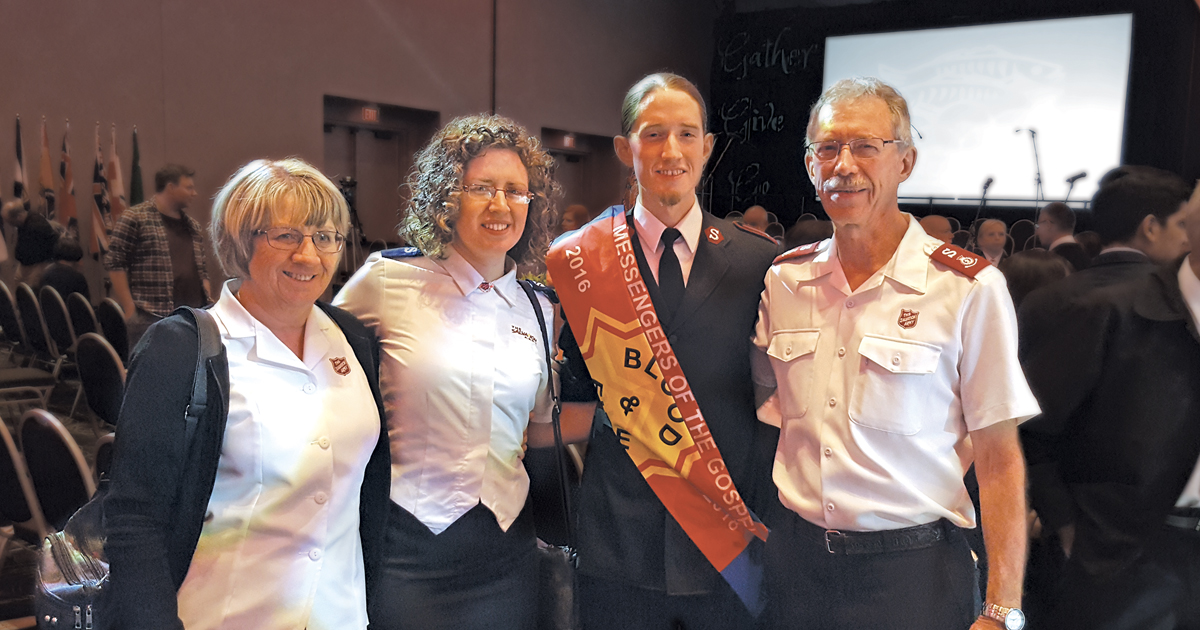(Above) The Dueck family at the commissioning of Lt Brian Dueck in 2018. From left, Mjr Juanita, Lt Kathryn, who was commissioned in 2020, Lt Brian and Mjr Roy
I grew up in a small farming community in the Red River Valley south of Winnipeg. My village was entirely Mennonite. We spoke low German at home and high German in church, and I learned to speak English at school when I was six. I accepted Christ as a young person and was baptized and joined the Mennonite church at 16.
We were a simple, hard-working religious people. In our village of Rosenhof, life revolved around the church, and we took the Bible literally.
2 Corinthians 6:17 says, “Come out from them and be separate, says the Lord.” So we removed ourselves from the world and formed our own closed communities. Our attitude toward the government and people of our host country was, “Leave us to ourselves: we’ll run our own schools and churches and solve our own problems, and we won’t be a burden to you.”
Matthew 5:39 says, “If anyone slaps you on the right cheek, turn to them the other cheek also.” So we were pacifists. We would not retaliate if attacked and would not fight in wars. Thousands of us suffered persecution, imprisonment and even death, rather than fight. Entire villages would migrate to a new country if the pressure became too great. That’s how we came to Canada, fleeing conscription in Russia in the 1860s and ’70s.
2 Thessalonians 3:16 says, “The one who is unwilling to work shall not eat.” So we Mennonites enshrined our work ethic. With grit, sweat and tears, we wrestled a living out of the swampland or stony bushland we settled for when we moved to a new country. And that is how Mennonites became known as farmers without equal in skill and hard work.
1 Peter 3:3 says, “Your beauty should not come from outward adornment.” So we dressed simply, in black or brown. Fashionable clothes, fancy hairstyles, jewelry—even wedding rings—were severely frowned upon. Simplicity of appearance and lifestyle was the rule.
The gospel was preached simply and sternly—heavy on rules and light on grace—and I accepted it.
Rebellion
But I became tired of the familiar, sheltered life and longed for something new and exciting. At 18, I left my safe, peaceful farming community for university and the big city, Winnipeg. I left behind not only wheat fields, home and family, but also the Christian faith I had always taken for granted.
I adopted some of the more exciting ideas I found there and embraced the exhilarating freedom from narrow beliefs and restrictions. My attitude led to a confrontation with the elders and ministers of my Mennonite church, which led to my excommunication from the church for false teachings.
After university, I embarked on a life of travel and discovery. For 10 years off and on, I wandered through 45 countries, from Iceland to South Africa, Cuba and Syria, collecting adventures and philosophies. I was on a quest for truth. I considered all philosophies of life, except the outmoded doctrines of evangelical Christianity. And if I encountered Christians along the way, I would do my best to shake their faith.
I savoured my life of adventure and discovery. Everywhere I went, I travelled with my eyes open to the wonders of the sights, sounds and smells of the cultures around me. And yet, all the while I was blind and didn’t realize it.
Finding Christ
Eventually, my journey took me to St. John’s, N.L., to see my sister, Lois, join The Salvation Army. It was an inexplicable turn-around for her because she and my brother both shared my skepticism toward religion and taste for world travel.
But something had happened to her. Lois had an encounter with God, a totally unexpected and intensely personal realization that he still loved her and was calling her to follow him again. I was disturbed that she would return to beliefs we’d long since left behind.
Then something happened to me, too. I attended a Salvation Army meeting, and the Bible message stirred chords inside me that had been silent for a long time. I mingled with people who took their faith seriously and with great love and enthusiasm. They gathered on Saturday nights and eagerly searched the Scriptures and debated what they found. I was amazed at how these people could take what I had dismissed as irrelevant and make it fresh and exciting—alive! I met one intellectual fellow who told me how he had become convinced of the authenticity and absolute truth of the Bible. It contrasted so sharply with my philosophy that there were no absolutes and we could never really know anything for certain. Everything I experienced during those two weeks in St. John’s—their hope, joy and authenticity—attracted me powerfully and, at the same time, repelled me as it clashed with my worldview.
And so in the quiet solitude of my room late one night, I reflected on all this. I was a man shaken to his roots. Perhaps it wasn’t too late. Perhaps I could find again that simple faith that brings life!
I swallowed my pride and called out to the God I had run from, the God I wasn’t even sure was there. And over me and into me and through me flowed the sweet presence of the living God, and the assurance that I was once again his child—forgiven, accepted and loved! It was the most intense experience I have ever had in my life.
Teach Me Thy Will
I quickly settled into the Haven of Hope Corps in St. John’s, and two marvelous years passed. I fell deeply in love with Jesus Christ, with people on the margins of society and with The Salvation Army.
Then one Sunday morning, Major Lloyd Hetherington, then assistant principal of the training college, was at the corps. He asked me if I had given any thought to officership. I said, “The Lord will have to tell me directly about something like that.”
At that Sunday morning meeting, I was playing accordion as the congregation sang I Need Thee Every Hour. We came to the fourth verse, which goes: “I need thee every hour, teach me thy will, and thy rich promises in me fulfil.” And the Spirit of God suddenly enveloped me. I stopped playing my accordion and became oblivious to the people in the meeting. I knew deep inside that God was calling me to officership. I entered training in 1987 and was commissioned in 1989.
Turning Point

Cpt Bethany Dueck (left)
During my first appointment as assistant at a large corps, I enthusiastically did the work of preaching, visiting, and so on. After two years, my wife, Juanita, and I were put in charge of a cluster of ministries in Hamilton, Ont., including refugee resettlement, an English-as-a-secondlanguage school, a Spanish ministry and a large program for seniors.
It was a turning point in my ministry. I developed a deep sense of weakness and inadequacy, especially in visionary leadership. I have a passive personality and find making decisions difficult, particularly when they involve other people. I felt overwhelmed and that I could never live up to expectations.
Like every cadet coming out of training college, I assumed I’d turn the world upside down, become a divisional commander and probably a commissioner down the road. Other times I would think, “Who on earth do I think I am? I’m just a great pretender, and one of these days I’ll be unmasked as the incompetent I really am!”
So I cried out to God. I never doubted my calling, but I certainly doubted my ability. God showed me his answer in a tiny five-verse chapter in the Book of Jeremiah, a mere parenthesis in the book, where God briefly addresses Jeremiah’s secretary, Baruch, through Jeremiah:
“This is what the Lord, the God of Israel, says to you, Baruch: You said, ‘Woe to me! The Lord has added sorrow to my pain; I am worn out with groaning and find no rest.’ But the Lord has told me to say to you, ‘This is what the Lord says: I will overthrow what I have built and uproot what I have planted, throughout the earth. Should you then seek great things for yourself? Do not seek them. For I will bring disaster on all people, declares the Lord, but wherever you go I will let you escape with your life’ ” (Jeremiah 45:2-5).
And then he guided me to 2 Corinthians 12:9: “My grace is sufficient for you, for my power is made perfect in weakness.”
God was telling me, “Never mind worrying about what you can do for me and the Army. Never mind whether you are successful in anybody’s eyes. I am doing my work and will achieve my results in spite of, and even because of, your weakness. But I will see you through!”
This was a tremendously humbling and greatly encouraging experience. From then on, I have developed a much clearer view and acceptance of who I am, what I am gifted for, and what I am weak in. My ministry must always be “not by might nor by power, but by [God’s] Spirit” (Zechariah 4:6).
I continue to be amazed that God would choose me—a person who used to try to turn Christians from their faith—to now preach and share the wonderful gospel of Jesus Christ. But that’s just God’s way with me.
Major Roy Dueck is a retired officer in Winnipeg.
This story is from:










Comment
On Friday, April 22, 2022, Lisa Stone (Giberson) said:
On Saturday, April 9, 2022, Grace Calvert said:
Wonderful testimony of God's faithfulness, thank you.
On Friday, April 8, 2022, Robert & Cassie Kean said:
Awesome God glorifying testimony Roy. It’s amazing how the Lord takes us as weak vessels and shows forth His awesome love and power. God bless you and Juanita.
On Friday, April 8, 2022, Joan Hammel said:
On Friday, April 8, 2022, Melvin Moss said:
On Thursday, April 7, 2022, Isaiah Allen said:
Glad to see a testimony with such honesty about the struggles and such truth about God's love, wisdom, and power. Glad to know this brother a bit better. Thanks!
On Thursday, April 7, 2022, James Read said:
I am privileged to know Major Roy Dueck, and to be part of the weekly small Bible Study group he leads. From that vantage point, I can verify that he is truly a man of Christian faith, experience, integrity, and humility. I love about him that he is both firm in his beliefs and open to further learning, sure that God has lots yet to feed his avid intellectual interests.
On Thursday, April 7, 2022, Lt. Sarah Apperson said:
Thank you for this encouraging testimony!
Leave a Comment